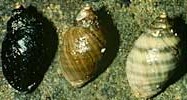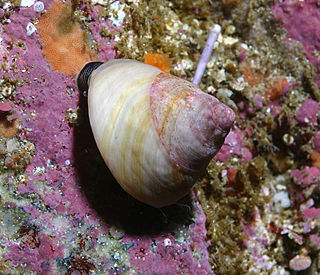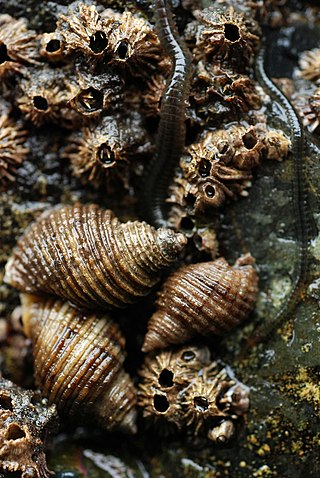
The dog whelk, dogwhelk, or Atlantic dogwinkle is a species of predatory sea snail, a carnivorous marine gastropod in the family Muricidae, the rock snails.

Nucella, common name dog whelks or dog winkles, is a genus of small to medium-sized predatory sea snails, marine gastropod mollusks in the subfamily Ocenebrinae which is part of the large family Muricidae, the murex snails or rock snails.

The knobbed whelk is a species of very large predatory sea snail, or in the US, a whelk, a marine gastropod mollusk in the family Busyconidae, the busycon whelks.

Busycotypus canaliculatus, commonly known as the channeled whelk, is a very large predatory sea snail, a marine prosobranch gastropod, a busycon whelk, belonging to the family Busyconidae.

Busycon is a genus of very large edible sea snails in the subfamily Busyconinae. These snails are commonly known in the United States as whelks or Busycon whelks. Less commonly they are loosely, and somewhat misleadingly, called "conchs".

The Scotch bonnet is a medium-sized to large species of sea snail, a marine gastropod mollusk in the subfamily Cassinae, the helmet shells and bonnet shells. The common name "Scotch bonnet" alludes to the general outline and color pattern of the shell, which vaguely resemble a tam o' shanter, a traditional Scottish bonnet or cap. The shell is egg-shaped and fairly large, 2 to 4 inches in maximum dimension, with a regular pattern of yellow, orange or brown squarish spots. The surface sculpture of the shell is highly variable: the surface can be smooth and polished, have grooves, be granulated, or even be nodulose on the shoulder of the whorls.

Dicathais is a genus of predatory sea snails, marine gastropod molluscs in the family Muricidae, the rock snails. This genus is monotypic; the only species in it is Dicathais orbita, common name the white rock shell or cart-rut shell, found round the coasts of Australia and New Zealand.

Buccinum undatum, the common whelk or the waved buccinum, is a large, edible marine gastropod in the family Buccinidae, the "true whelks".

Calliostoma ligatum, common name the blue top snail, is a small prosobranch trochid gastropod mollusk in the family Calliostomatidae, the Calliostoma top snails.

Tegula pulligo, common name the dusky tegula, is a species of medium-sized sea snail with gills and an operculum, a marine gastropod mollusc in the family Tegulidae.

Cittarium pica, common name the West Indian top shell or magpie shell, is a species of large edible sea snail, a marine gastropod mollusk in the family Tegulidae. This species has a large black and white shell.

Nucella canaliculata, commonly known as the channeled dog winkle or the channeled purple, is a species of sea snail, a marine gastropod mollusk in the family Muricidae, the murex snails or rock snails. The shell grows to a maximum length of about 4 cm (1.6 in). This species is distributed in the northeastern Pacific Ocean from the Aleutian Islands to California.

Nucella emarginata, common name the emarginate dogwinkle, is a species of medium-sized predatory sea snail, a marine gastropod mollusk in the family Muricidae, the murex snails or rock snails.

Nucella ostrina, the northern striped dogwinkle, is a species of sea snail, a marine gastropod mollusk in the family Muricidae, the murex snails or rock snails. Other common names for this mollusk include emarginate dogwinkle, short-spired purple dogwinkle, striped dogwinkle, ribbed dogwinkle, emarginate whelk, ribbed rock whelk, rock thais, short-spired purple snail and rock whelk.

Trochus radiatus, common name the radiate top shell, is a species of sea snail, a marine gastropod mollusk in the family Trochidae, the top snails.

Buccinum baerii, common name Baer's buccinum, is a species of sea snail, a marine gastropod mollusk in the family Buccinidae, the true whelks. The epithet is written by some authors as "baeri".

Margarites pupillus, common name the puppet margarite or the little margarite, is a species of sea snail, a marine gastropod mollusk in the family Margaritidae, the turban snails.

Tenguella marginalba is a species of sea snail, a marine gastropod mollusc in the family Muricidae, the murex snails or rock snails. It is commonly known as the mulberry whelk and is found in shallow waters in the Indo-Pacific and around the north and east coasts of Australia.

Semibalanus cariosus, commonly known as the thatched barnacle, rock barnacle or horse barnacle, is a species of acorn barnacle occurring in the northern Pacific Ocean.

Lirabuccinum dirum, commonly known as the dire whelk, the spindle shell or the spindle whelk, is a species of sea snail, a marine gastropod mollusk in the family Buccinidae, the true whelks. It used to be known as Searlesia dira and Buccinum dirum before being transferred to the genus Lirabuccinum.



















